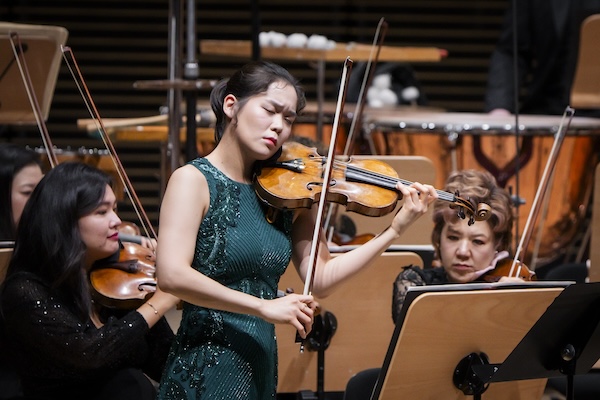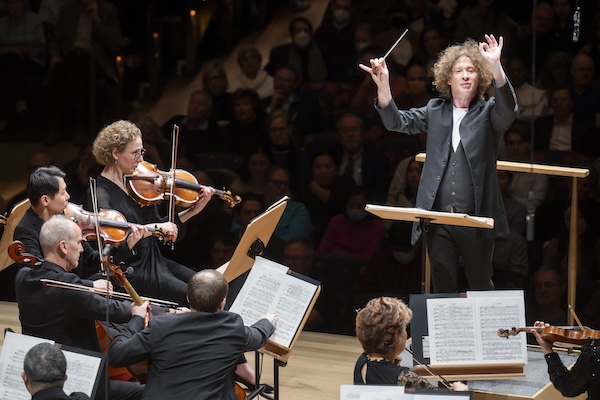Bernstein “Serenade” charms and Strauss Alpine climb exhausts with Philharmonic

In 1911, Richard Strauss, by then mainly an opera composer, had one more idea for an orchestral tone poem, inspired by Friedrich Nietzsche’s essay in which contemplation of nature took the place of traditional religion. He gave the piece Nietzsche’s title: Der Antichrist.
Later, to the relief of concert programmers everywhere, Strauss changed the title to Eine Alpensinfonie. Thursday’s rather aggressive reading of the work by Santtu-Matias Rouvali and the New York Philharmonic, however, sometimes put one in mind of the original title.
Earlier in the evening, violinist Esther Yoo made a warmly received Philharmonic debut in another piece with philosophical overtones, Leonard Bernstein’s Serenade (after Plato’s Symposium) for violin, string orchestra, harp, and percussion, composed in 1953-54.
The parentheses in the Bernstein title are a clue to the piece’s history: Rather late in the compositional game, the composer, ever the Harvard man, dressed up the concerto he was writing for Isaac Stern with some allusions to ancient Greek poets and philosophers.
So on Thursday there was one composer stepping off the philosophical train and another hopping on. In the end, it was the notes that mattered.
The concert was to have featured a reprise of Rouvali’s much-admired 2018 recording of the Bernstein with violinist Baiba Skride, but the latter’s withdrawal brought on Yoo instead, in a charming if not exactly robust performance.
The slender filament of her opening monologue grew nicely into a jaunty, percussion-driven waltz in the first movement, “Phaedrus: Pausanias.” She sketched the comic playwright Aristophanes in his eponymous movement as a gentle storyteller in dialogue with the orchestral strings, saving the knockabout comedy for the sparkling runs and scratchy ponticello of the fleeting scherzo “Eryximachus.”
Yoo’s silvery tone wrapped around the nuances of the love ode “Agathon,” although one couldn’t help imagining how the movement’s climactic double stops must have glowed under Stern’s bow. The compound finale “Socrates: Alcibiades” was distinguished by Yoo’s duo-cadenza with principal cellist Carter Brey in the serious part and by jazzy revelry later on—guaranteed to have 1954 concertgoers reaching for their smelling salts, but earning Yoo, Rouvali and the band nothing but enthusiastic applause on Thursday.
In fact, the uninhibited Geffen Hall audience applauded after every movement of the Bernstein, and hooted loudly at the blazing fiddling of Yoo’s solo encore, Henri Vieuxtemps’ Souvenir d’Amerique, a set of virtuoso variations on “Yankee Doodle.”
Listeners returned from intermission to find the Geffen stage crammed to the walls with musicians, a promise of Alpine glory and grandeur to come. And as the symphony got under way, a swell of deep brass evoked the massive mountain in the pre-dawn gloom.

The sunrise, however, far from unfolding a carpet of rich colors, switched on like klieg lights amid honking horns and squealing piccolo. It was the first of several fortissimo climaxes in the piece that sounded more shrill than mountainous. (The realistic storm scene, of course, screeched and banged exactly as it should.)
The human element of this panorama arrived in the form of hikers marching up the mountain, a distant hunting party represented by 12 offstage horns, and the hikers losing their way in a chromatic thicket. Rouvali seemed to emphasize their smallness and individuality by avoiding mixing tones and featuring the separate sections of the orchestra instead of a blended tutti.
Unfortunately, this X-ray approach sometimes bled over into more naturalistic moments when a broader, fuller sound would have been welcome, for example in that moment before the storm when the afternoon mists rose up and obscured the sun.
As the piece’s 22 sections unfolded, outlining a full day on the mountain in about an hour, there were magical moments, such as that looming brass at the start and the “Apparition,” a forest sprite glimpsed in a waterfall of harp and string glissandos.
But for every one of those, there were prosaic moments when the music remained earthbound amid all that Alpine beauty and strangeness. As the piece descended again into night, the performance seemed not to reflect or to sum up, but only to inch through a thicket of V-I, V-I cadences toward a long-awaited end.
Rouvali could at least have asked some players to steal in on their pianissimo entrances, rather than just playing the note on time. That’s how the notes start to matter, and maybe a bit of philosophy gets in there too.
The program will be repeated 8 p.m. Saturday, 2 p.m. Sunday and 7:30 p.m. Tuesday. nyphil.org.
Posted Feb 09, 2024 at 3:28 pm by John F Kelly
I agree with most of this review. The violin soloist should be invited back to the NYPO – she has personality, a dazzling technique and if not the biggest sound, a very sweet tone in lyrical passages. She played the heck out of the Bernstein and her encore was fun.
On the other hand, the Strauss was much too slow overall and it was a real schlep up and down the mountain. There was no tension, no drama even. Geffen Hall is not the place to hope the performance will be good because of tonal beauty, it is a stark, almost forensic acoustic.
And I might add the electronic organ was too loud much of the time and sounds utterly wretched.
Posted Feb 11, 2024 at 2:43 am by Michael Kalman
Woo did an excellent job bringing lyricism and nuance to Bernstein’s acerbic — if brilliant — score. Rouvali did an excellent job of shaping this work into a convincing and indeed compelling ensemble piece. So much so, that it left this listener wondering what other hidden gems lie in Bernstein classical oeuvre.
The Strauss, on the other hand, was a painful mess. Rouvali seemed to be interested in one thing and one thing only: bombast. It takes a much more seasoned and experienced conductor to keep these gargantuan forces under control, much less in balance. In this regard, the performance was an abject failure for Rouvali. Sitting in mid-orchestra, it was absolutely impossible to hear the stings when the brass section was going at it with apparent free abandon. The symphony could not end fast enough for me.
Posted Feb 11, 2024 at 2:02 pm by John F Kelly
I was upstairs at the back and I could hear the strings, but of course it was all too slow and boring and I wanted to go home after the first 5 minutes (but didn’t want to disturb my neighbours).
May I suggest never sitting downstairs in the hall, that’s the worst place for sound unless you’re listening to a singer. For big pieces you have to be upstairs center/ Bernstein said it and it’s still true post-renovation.
Posted Feb 12, 2024 at 11:14 am by Nick K
I agree with the disappointment around the Strauss. Personally I thought Rouvali took it way too slow at the beginning and there was no subtle buildup in volume and life. The horns and woodwinds were impressive throughout but not well balanced in the more powerful moments. In the climax at the summit for example, I could barely hear the lead trumpet playing the famous excerpt going up to the high F and collapsing down.
A symphony like this needs strong leadership and guidance from the conductor, and Rouvali seemed to be leaving it up to the orchestra. That said, I love Strauss and it was still very enjoyable to hear.